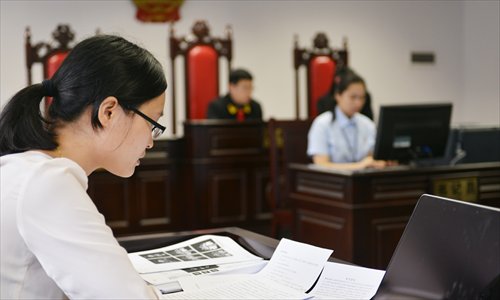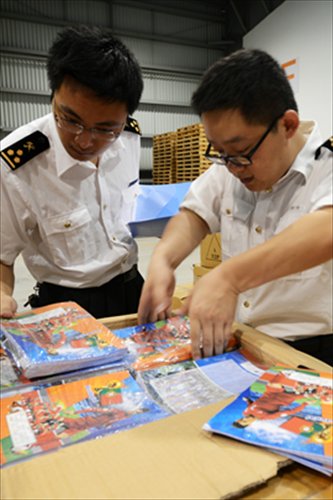HOME >> CHINA
Intellectual pursuits
Source:Global Times Published: 2014-7-24 18:58:01
China plans establishment of IPR courts throughout nation

The No.2 People's Court of Zhongshan, Guangdong Province, opens proceedings for its first lawsuit over copyright infringement on May 16. Photo: CFP

Customs officials from Zhoushan, Zhejiang Province, check their inventory of 55,000 notebooks suspected of being involved in copyright infringement on June 20. Photos: CFP
"Setting up intellectual property courts is a critical step forward for China's judicial reform," said Feng Xiaoqing, an intellectual property law expert with the China University of Political Science and Law.
In a historic move to step up intellectual property rights (IPR) protection standards, China has recently completed the initial phases of planning to establish the nation's first batch of IPR courts in Beijing, Shanghai and Guangdong, the Legal Weekly reported on July 16.
The country first announced the plan to set up a special court to handle IPR disputes in a landmark policy document released during the Third Plenary Session of the 18th CPC Central Committee in Beijing last November.
As the nation's economic power and international standing grows, the recent issuing of a massive 260 million yuan ($42 million) fine against popular video sharing site QVOD, also known as kuaibo, has raised the public's awareness of China's development of IPR.
Setting standards
"China has become a leading owner country of intellectual property," said a partner of Perkins Coie LLP, a US-based international firm specializing in business law and litigation, during his attendance at an IPR conference in Hangzhou, Zhejiang Province in late 2013.
While China topped the world's list of patent applications in 2011, disputes have also multiplied. Over 100,000 cases were handled from 2009 to 2013. In 2013, over half of the disputed cases were related to foreign companies, according to the Beijing Times.
"The establishment of such courts will be hugely beneficial to China's economic and market structure," said Fu Zitang, president of Southwest University of Political Science and Law.
Feng Xiaoqing said the move represents China's latest effort to match domestic judicial practice with international standards, as countries like the US, Japan, Germany, the UK, Russia and Thailand have such courts in place already.
The new courts are also expected to standardize the guidelines for court rulings.
"I recently received a case and found out that rulings in the courts in Guangdong and Shanghai can be completely different, even with the same claimant and the same act of infringement," said Cheng Yongshun, deputy president of the China Intellectual Property Law Association, adding that it is essential to rule out unpredictability in terms of ruling standards in intellectual property cases.
Cao Xinming, deputy head of Research Center of Intellectual Property Right at Zhongnan University of Economics and Law, echoed this view and said China lacks standardized practices when handling related cases.
"While IPR cases in one region are passed to the grass-roots court, similar cases in another region are passed to the intermediate court," said Cao.
Early stages
China is equipped with the basic infrastructure to prepare for the establishment of IPR courts in the future, said Gong Jiali, deputy director of Supreme People's Court's political department.
According to Gong, nearly 100,000 related cases have been handled in IPR tribunals in over 30 higher courts and over 400 intermediate and grass-roots courts.
"The plan [to set up IPR courts] is still at the infancy stage and we will explore its feasibility through a pilot group of a small number and scale of courts," said Gong.
According to the preliminary plan, IPR courts will be set up in Beijing, Shanghai, and Guangdong due to the higher frequency of cases as well as concentrations of qualified individuals in these regions.
Nearly half of the nation's intellectual property rights cases were handled in Beijing, Shanghai, Shenzhen and Guangzhou as of 2010, reported the Legal Weekly.
The court's first branch is likely to be set up in Guangdong, a bustling trading hub, with more branches in big cities later, the Hong Kong-based South China Morning Post (SCMP) reported.
Guangdong Governor Zhu Xiaodan said the province, which had "long enjoyed the freedom to experiment," would strive to become part of the pilot program. The cities of Guangzhou, Shenzhen and Zhuhai had filed proposals to build the first court, Xu Chunjian, a senior judge handling IPR protection in Guangdong's high court, was quoted as saying by the SCMP in late April.
"The notion and the law of IPR is the key for indigenous innovation. The government needs to strengthen its administration system to better serve innovative companies and protect them," said Zhu.
Zheng E, head of the provincial high court, reportedly said Guangdong had 306 judges who could handle IP cases.
According to the white paper on IPR protection issued in April by the Supreme People's Court, there were 88,286 civil cases tried last year, a 5.29 per cent annual increase.
Xu, a senior judge in Guangdong, said the new court's presence is important in attracting companies to enter the planned free-trade zone connecting Guangdong with Hong Kong and Macau.
Tough job
"Requirements are harsher for judges handling IPR cases due to the complexity of these cases that involve highly technical and professional knowledge," noted Feng, adding that these cases often involve cross-disciplinary handling of civil, administrative and criminal procedures.
China began its IPR protection efforts in 1993 when the first intellectual property tribunal was established at the Beijing Intermediate People's Court. In 1996, the Shanghai Pudong New Area People's Court set up a intellectual property tribunal to conduct "three-in-one" trials that manage civil, administrative and criminal cases, the People's Daily reported.
The "three-in-one" trial practice has now extended to six higher courts, 74 intermediate courts, and 80 grass-roots courts across the country.
As of late 2012, there was a total of 420 intellectual property tribunals, and more than 2,700 judges who specialize in related cases, according to the State Intellectual Property Office's official website.
Some experts pointed out concerns over the neutrality of intellectual property courts, as some local courts may tend to safeguard local interests by favoring local companies in their rulings.
"The lack of a centralized judicial body may still trigger regional disputes over related trials,"Yi Jiming, director of the Institute for International Intellectual Property of Peking University, told the Legal Weekly.
Posted in: Society